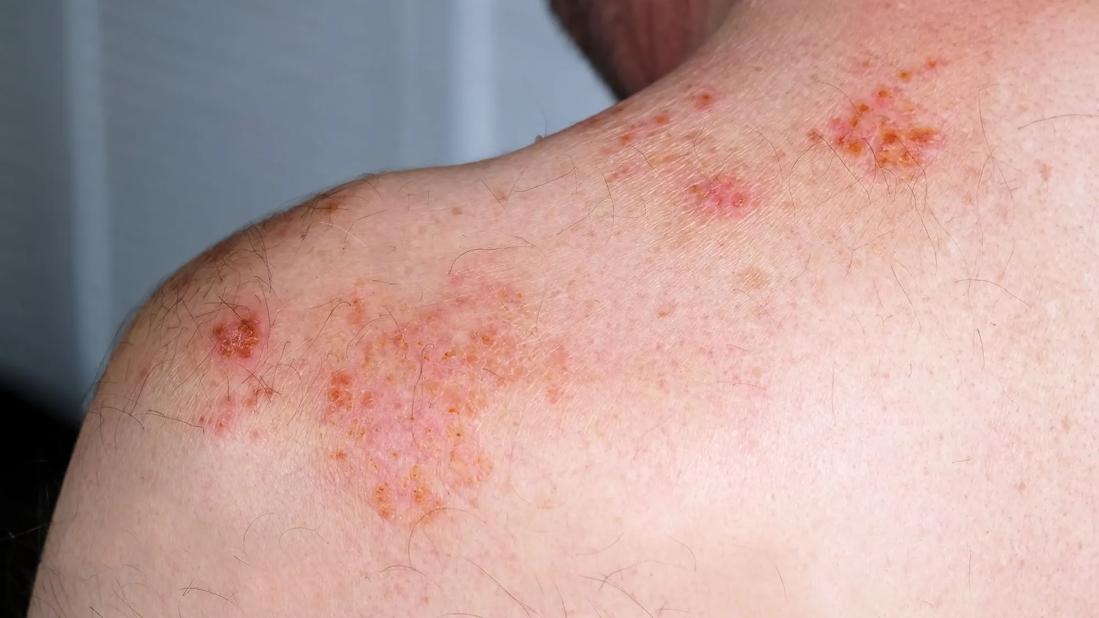If you have a weakened immune system, your risk for getting shingles a second or third time increases

Image content: This image is available to view online.
View image online (https://assets.clevelandclinic.org/transform/7d2b4a8a-b72e-4230-9bdf-60da20353e48/shingles-skin-2208770097)
Shingles outbreak on shoulders
If you ever had chickenpox as a child, you probably know that there’s the possibility of it popping back up again later in life as shingles. And if it does come back, it’s painful, itchy and irritating. But it usually goes away within three to five weeks with the help of treatment.
Advertisement
Cleveland Clinic is a non-profit academic medical center. Advertising on our site helps support our mission. We do not endorse non-Cleveland Clinic products or services. Policy
Still, there’s always the risk shingles could return a second or third time, says infectious disease expert Kruti Yagnik, DO. It all depends on the strength of your immune system.
Most people only get shingles one time, but anywhere from 1.2% to 9.6% of people may experience shingles more than once. In most of these cases, shingles resurfaces because a weakened immune system allows the varicella-zoster virus (the same virus that causes chickenpox) to get reactivated. And once you’ve had this virus a single time, it continues to stay dormant (or asleep) inside your body’s nerve tissues.
“It’s not that it’s not treatable,” says Dr. Yagnik. “It’s that, over time, it’s going to reactivate again because your immune system can’t keep it in check.”
Shingles often start with pain, burning or tingling on the affected area, followed by fluid-filled blisters that break open and crust over within a matter of days. It typically happens only on one side of your body and can come with other symptoms like:
“Most people say the first time they have shingles is the worst and it’s not as bad the second or third time, but every person is different and it depends on your immune system, the medications you’re taking and how healthy you are,” notes Dr. Yagnik.
Advertisement
Over time, especially if you’ve had shingles more than once, you can also experience chronic nerve pain, called postherpetic neuralgia, from your nerves being irritated by the virus. And whether it’s your first or second time, you’re contagious with shingles until the rash itself is dried and crusted over.
Having shingles once increases your chance of future outbreaks, but not everyone experiences it a second time. Recurrent shingles usually occurs as a result of a weakened immune system. Our immune systems tend to weaken naturally as we age, but we can also become immunocompromised as a result of various other medications or medical conditions like:
“The virus that causes shingles stays in your body,” reiterates Dr. Yagnik. “Anything that weakens your immune system can cause it to resurface.”
Whether it’s the first, second or third time, shingles treatment typically involves antiviral medications like acyclovir or valacyclovir until the shingles subside within three to five weeks. During that time, you can relieve your pain and reduce the severity of your symptoms with the help of:
During treatment, you want to:
You can’t really prevent a shingles outbreak from happening, but you can get the shingles vaccine to reduce the likelihood of it popping up again, even if you have a weakened immune system. Other than that, you want to do whatever you can to improve and maintain the health of your immune system, as this will help stave off recurring infections. That means:
“All of these things help more in the long term than you may think,” advises Dr. Yagnik. “Anything that can keep your immune system healthy is a good thing.”
Advertisement

Sign up for our Health Essentials emails for expert guidance on nutrition, fitness, sleep, skin care and more.
Learn more about our editorial process.
Advertisement
It’s 97% effective in preventing shingles in people between the ages of 50 and 69
But if you haven’t been vaccinated, you could get chickenpox from somebody with shingles
Postherpetic neuralgia is challenging, but help is available
Dressing in multiple layers, drinking warm liquids and taking breaks indoors can help prevent these cold-weather injuries
Infants are at high risk of severe RSV, but getting the vaccine during pregnancy helps protect them from it
Eczema triggers are different for everyone, but there are some common ways to manage flare-ups, like using a humidifier and fragrance-free creams
Over-the-counter antifungal creams usually get the job done, but it’s important to keep it from spreading in the meantime
Although it could be used as a moisturizer, this new trend is not recommended
Although it could be used as a moisturizer, this new trend is not recommended
Communicating clear limits helps protect your time, energy and emotional well-being
High cholesterol can be genetic, but testing and treatment can lower your heart disease risk